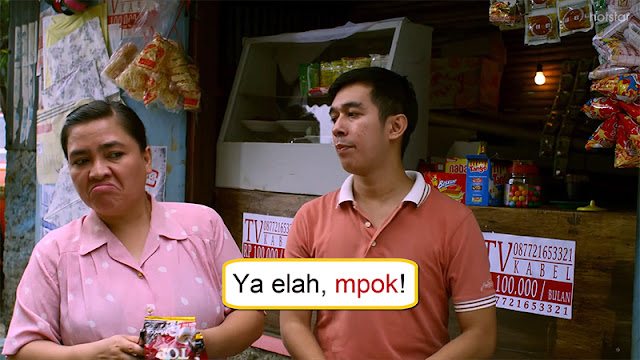- Get link
- X
- Other Apps
Posted by
Iman Prabawa
on
- Get link
- X
- Other Apps
Halo semuanya. Ketemu lagi sama saya, Iman Prabawa. This time, I want to talk to you about the meaning of the word [mpok] in the Indonesian language. Actually, it is a Betawi word, but sometimes you will hear it when you watch Indonesian movies.
As always, we will watch scenes from movies where this word [mpok] is spoken to better understand the meaning.
If you are a beginner in the Indonesian language, you can learn step by step with My Lesson Here.
So, without further ado, let's talk about it.
Mpok in the Indonesian Language
[Mpok] is a word that comes from the Betawi language. [Mpok] is an honorific title used to address females who are older than us. It's like [mbak] in the Javanese language or [teteh] in the Sundanese language.
In Indonesia, almost every region has its own regional language, and the language in one region differs from the language in the other region. So, it is good for you to know about the meaning of the word [mpok] because if you are in Jakarta, you will sometimes hear people say this word.
You may find variations in the way this word is written. Like, for example, in the picture below that I found.
The person who sells this food is a Betawi person, and she writes it like this, without the letter [k] in the end. By the way, [nasi uduk] and [lontong sayur] are the names of the dishes she sells.
How to Pronounce Mpok
Let's hear how to pronounce [mpok] in the video below.
Next, we will look at examples where the word [mpok] is used by Indonesians.
Examples of Mpok In Use
In this section, I gathered examples where the word [mpok] is used by Indonesians so you can better understand how Indonesians use this word.
The first example is from Bajaj Bajuri The Movie (2014). Let's watch the clip below.
In this clip, the man addresses the woman with [mpok]. You can still address a female person with [mpok] even though she is your age. It is just to make it more polite.
You can watch all the clips on my Buy Me a Coffee post without the black screen. I also provided the captions in Indonesian with English translations and vocabulary explanations so you could better understand what happens in the clip. I explain this on my About Me page.
The second example is still from the same movie, Bajaj Bajuri The Movie (2014). Let's watch the clip below.
In the clip, Oneng was riding a motorbike that we call Ojek in Indonesia. An Ojek is a person who rides a motorbike. You can pay him to take you wherever you want, and then you pay him the fee. As you can see, the motorbike rider addresses her with the word [mpok].
You can watch all the clips on my Buy Me a Coffee post without the black screen. I also provided the captions in Indonesian with English translations and vocabulary explanations so you could better understand what happens in the clip. I explain this on my About Me page.
The third example is from the movie Pacar Kontrakan (2010). Let's watch the clip below.
In this clip, Aladin addresses Caty with the word [mpok]. Still, Caty refuses to be called using the honorific title [mpok] because she is not originally from Jakarta or, in this case, a Betawi person.
If you are in Central Java and East Java, there is an honorific title that you can use to address females who are older than you. You address them by adding the word [mba] before their names.
If you are in West Java, there is also an honorific title that you can use to address females who are older than you. You address them by adding the word [teteh] before their names.
You can watch all the clips on my Buy Me a Coffee post without the black screen. I also provided the captions in Indonesian with English translations and vocabulary explanations so you could better understand what happens in the clip. I explain this on my About Me page.
I think this is all for now. If you have any questions regarding this topic, you can just leave them in the comment section below, and I'll be happy to answer them. Insha Allah, if I find another scene where this word [mpok] is spoken, I will update this article again.
Thank you for reading this article, and I'll see you soon. Bye now.
- Get link
- X
- Other Apps
Hello, I'm Iman Prabawa a.k.a Pak Guru Iman. I love to share about languages. My Instagram, @iman_prabawa


Comments
Post a Comment